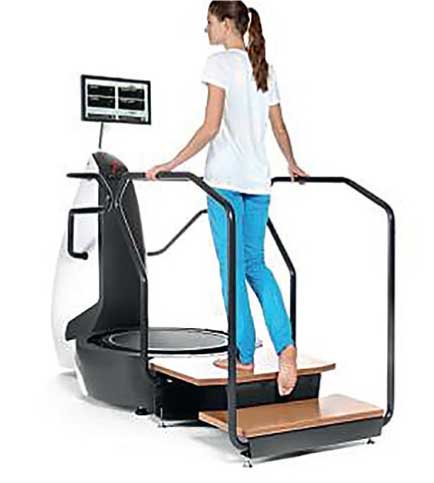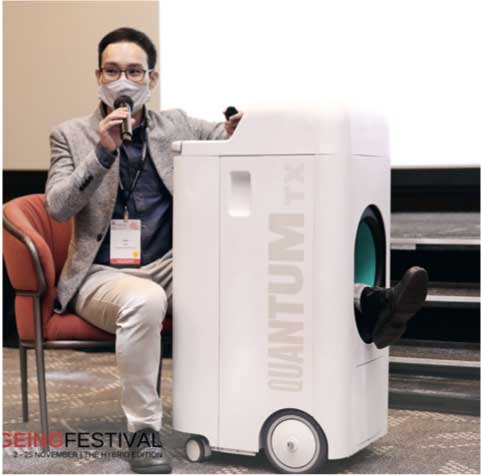Stories > Ageing Gracefully
Ageing Gracefully
Global thought leaders discuss best practices and innovative solutions in eldercare at the 11th International Ageing Asia Innovation Forum & Exhibition in Singapore.
BY DENISE CHAN
PHOTOS ISTOCK
y 2050, one in six people in the world will be over age 65, up from one in 11 in 2019, according to data from the United Nations report titled 2019 Revision of World Population Prospects (see sidebar).
While a longer life presents the elderly with many opportunities to pursue activities such as learning new skills, starting a new career and contributing to local communities, the extent of these pursuits depends heavily on good health.
“TO BUILD A VIBRANT COMMUNITY OF CARE TO ENABLE SINGAPOREANS TO LIVE WELL AND AGE GRACEFULLY, THE MINISTRY OF HEALTH AND AIC ARE BUILDING A SYSTEM WITH FOUR KEY LAYERS,” SAYS TAN KWANG CHEAK, CEO, AGENCY FOR INTEGRATED CARE.

Digital technology has played a big role during the ongoing Covid-19 pandemic in providing health consultation access to seniors who live alone or in remote areas.
Some of these topics were discussed at the 11th International Ageing Asia 2020: World Ageing Festival (The Hybrid Edition) that was held in Singapore in November last year. Riding on the theme of “Age of Collaboration”, it hosted a global audience of healthcare and eldercare professionals from both public and private sectors, community leaders and business representatives. In light of the cross-border movement restrictions due to the Covid-19 pandemic, the event was organised as a combination of physical seminars for local attendees and a virtual event for international participants.
Presented over 140 hours, it highlighted insights and best practices from 150 global thought leaders and changemakers in the field of health and eldercare. Embedded into the discussions was a virtual showcase of the world’s best eldercare models and health innovations, products, programmes and services that are designed to enable healthy, independent and dignified ageing.
“The Covid-19 situation has presented the healthcare and eldercare sectors with great challenges. This event aims to bring the industry and community together to navigate this challenging time, and promote cross-sector collaborations that can address the well-being concerns of our ageing population,” says Janice Chia, founder of Ageing Asia, the event’s organiser and the region’s first ageing marketing consultancy social enterprise.
LIVING LONGER AND HEALTHIER
In his keynote speech during the opening of the festival, Professor Andrew J. Scott, co-author of the best-selling book The 100- Year Life: Living and Working in an Age of Longevity, shared with participants on how we could adapt and flourish in a changing world as we celebrate longer life spans. He observes that making the most of longer lives requires investing in a range of assets and activities, which includes finances, health, skills, relationships and purpose.
“In thinking about your future, you would be guided by two thoughts: First, you have a longer future and so you need to be more forward-looking,” he explains.
“Second, be aware that with longer lives, you need to behave differently at your age as compared to your parents’ and existing social norms.”
This resonates particularly well with countries that are increasingly faced with the challenges of addressing the needs of their ageing populations. Tan Kwang Cheak, CEO of Singapore-based Agency for Integrated Care (AIC), touched on how to enable an integrated care ecosystem for the city state’s seniors.
“To build a vibrant community of care to enable Singaporeans to live well and age gracefully, the Ministry of Health [MOH] and AIC are building a system with four key layers: proactive senior outreach, a health and wellness programme to delay frailty, a community network centred on seniors, as well as senior-centric help and accessible care services,” he says.
A 2018 report by the Lien Foundation stated that more seniors are using subsidised home- and centrebased care services. It also cited that the median waiting time for general daycare was about 20 days, while that for dementia care was about 35 days.
In relation to the demand for eldercare, MOH announced last December that seniors in Singapore will be able to receive information and referral to care services and take part in active ageing programmes at 280 eldercare centres across the island from 2021, regardless of their income or frailty levels.
KEEPING ELDERCARE AFFORDABLE
With the demand for senior care increasing, Reuben Khoo, CEO, Home Instead Senior Care, Singapore, has witnessed an emerging gap in senior care delivery in many countries. “The demand for care is outstripping the supply. At the same time, the cost of healthcare is increasing. Many countries are likely to face fiscal and political pressures in relation to public systems of healthcare, pensions and social protections for an ageing population,” he says. “There is a need to develop the home-care sector as an alternate viable option to step down intermediate and long-term care in order to help reduce cost and meet the care recipients’ aspirations of ageing in place.”
While care programmes and centres might be more easily available now than, say, a decade ago, their affordability remains a big challenge. Ng Li Lian, co-founder of home-care health provider Tetsuyu Healthcare Holdings, points out that access to affordable care and opportunity to age in place with dignity are the two key challenges faced by a rapidly ageing population. “Amid the Covid-19 pandemic, the roles that digital platforms and remote care play have become even more critical in eldercare, particularly for those living alone or in less urbanised areas,” says Ng.
Indeed, coping with the concerns resulting from an ageing population is impacting not just developed countries but also the developing world. But there is a silver lining filled with opportunities amid the challenges, according to Dr Lam Ching-Choi, member of the Executive Council, Hong Kong Special Administrative Region (SAR) and The People’s Republic of China.
“As the education attainment of the older population continues to improve, our elderly would have stronger purchasing power and greater ability to access information. The silver market will continue to expand, and the demand for gerontechnology products that can enable seniors to age in place will grow,” adds Dr Lam, who is also the chairman of the Elderly Commission of Hong Kong SAR and CEO at Haven of Hope Christian Service, a non-profit that provides eldercare and rehabilitation services.

Digital technology has played a big role during the ongoing Covid-19 pandemic in providing health consultation access to seniors who live alone or in remote areas.
LIFESTYLE INTERVENTION
Over in Europe, too, the effects of an older population on society have led to an emphasis on active ageing. Speaking at a digital conference during the event, Tila Ngandu, associate professor at the Finnish Institute for Health and Welfare, shared that lifestyle intervention is necessary in order to prevent dementia. “We have evidence that supporting healthy lifestyles – including healthy diet, physical activity, cognitive and social activities, and managing heart risk factors – helps to maintain cognitive and functional health among older adults,” says Prof Ngandu.
According to top medical journal Lancet, a Finnish Geriatric Intervention Study to Prevent Cognitive Impairment and Disability, comprising 1,260 individuals aged between 60 and 70 years, showed that there is a lower risk of new chronic diseases and less decline in daily functioning when the elderly were subjected to an intervention of diet, exercise, cognitive training and vascular risk monitoring.
“Sharing ideas and good practices is a way of accelerating development that can support healthy and happy ageing in economies.” Jane Ashcroft, CEO, Anchor Hanover Group, UK
Emphasising the need for tech-driven solutions, one of the speakers, Jane Ashcroft, CEO of the UK’s Anchor Hanover Group, which owns and manages 54,000 homes for older people, said that the event provided a timely opportunity for the industry to accelerate innovation. “Sharing ideas and good practices is a way of accelerating development that can support healthy and happy ageing in economies,” she adds.
“While there might be specific challenges and the available support for the elderly might differ among countries, many of these issues and solutions discussed at the event can go a long way in enhancing the quality of life for older people, and alleviate the pressure on available resources.”
LEVERAGING TECHNOLOGY
The world’s top 100 innovations in the senior-care sector were showcased during the event. Here are three of them.
 BUDDY
is the first-of-its-kind artificial intelligence (AI) and machine learning-driven app devised by Californiabased company Live Freely. The app is synced with a wearable device (such as an Apple Watch or Fitbit) that can predict things like falls, monitor for irregular health patterns, and keep seniors from getting lost. By using AI, the app sends timely updates to all the designated recipients and caregivers of the user.
BUDDY
is the first-of-its-kind artificial intelligence (AI) and machine learning-driven app devised by Californiabased company Live Freely. The app is synced with a wearable device (such as an Apple Watch or Fitbit) that can predict things like falls, monitor for irregular health patterns, and keep seniors from getting lost. By using AI, the app sends timely updates to all the designated recipients and caregivers of the user.
 Sense Wave
, a free-moving sensor platform, provides support diagnosis therapy and training of motor functions and postures for the elderly who suffer from musculoskeletal system disorders – a common sign of ageing. The circular step platform can be moved in three dimensions and contains over 5,300 highly sensitive pressure sensors that measure the pressure points on the user’s soles and visualise them in real time. Using this data, experts can support rehabilitation by creating specific strength and movement-control training while preventing falls.
Sense Wave
, a free-moving sensor platform, provides support diagnosis therapy and training of motor functions and postures for the elderly who suffer from musculoskeletal system disorders – a common sign of ageing. The circular step platform can be moved in three dimensions and contains over 5,300 highly sensitive pressure sensors that measure the pressure points on the user’s soles and visualise them in real time. Using this data, experts can support rehabilitation by creating specific strength and movement-control training while preventing falls.
 Bixeps, created by Singaporebased medtech firm QuantumTX, is a device that provides a safe and nonionising alternative therapy for muscle strengthening, using low-frequency and low-energy electromagnetic fields. While it is not a replacement for physical exercise, it can be used to amplify the outcomes of exercise regimens. Apart from optimising the activation of mitochondria, also known as the “powerhouse” in our cells, it also helps to regulate anti-inflammatory myokine levels – typically released during exercise, which help to regulate other bodily functions such as metabolism, regeneration and immunity.
Bixeps, created by Singaporebased medtech firm QuantumTX, is a device that provides a safe and nonionising alternative therapy for muscle strengthening, using low-frequency and low-energy electromagnetic fields. While it is not a replacement for physical exercise, it can be used to amplify the outcomes of exercise regimens. Apart from optimising the activation of mitochondria, also known as the “powerhouse” in our cells, it also helps to regulate anti-inflammatory myokine levels – typically released during exercise, which help to regulate other bodily functions such as metabolism, regeneration and immunity.
|
GLOBAL AGEING Here is what scientists are predicting the aged population to look like by 2050.
|
|
28% People aged 65 and above, up from the current 16%.
|
|
426 million The number of people globally aged 80 years, which is triple that of the current population.
|
|
54% The percentage of women in the global population aged 65 and above.
|
|
19 years The projected additional life expectancy of a 65-year-old person globally from the current 17 years.
|
